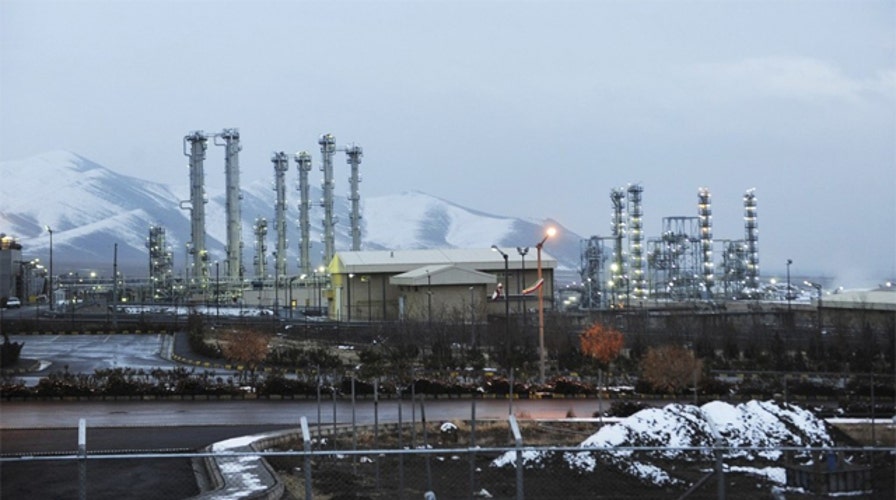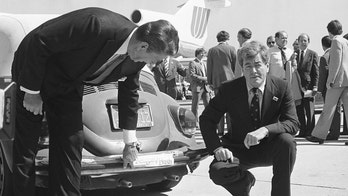Iran President Hassan Rouhani said Sunday that his country would not be pushed to stop enriching uranium hours after talks between Iran and six Western nations broke up without a deal being struck over the former's nuclear program.
The remarks came as Rouhani and his envoys sought to assure hard-line critics that Iran will not make sweeping concessions in the negotiations, which in Geneva early Sunday and are scheduled to resume Nov. 20.
In an address to parliament, Rouhani said uranium enrichment is a "red line" that cannot be crossed.
"Nuclear rights in the international framework, including uranium enrichment, on its soil" are not negotiable, Rouhani was quoted as saying by the semiofficial ISNA news agency. "For us, red lines are not crossable."
Negotiations between Iran, the five permanent members of the United Nations Security Council (the U.S., Great Britain, Russia, China, and France), and Germany hit a snag Saturday after France expressed concerns that the proposed deal did not do enough to trim Iran's nuclear ambitions.
French foreign minister Laurent Fabius said that the talks managed to narrow differences without eliminating them, saying there are "still questions to be dealt with" in future rounds. Later, Fabius told France-Inter Radio that France did not want to be part of a "con game."
U.S. Secretary of State John Kerry said "significant progress" had been made on the differences that remain. However, Kerry also acknowledged there were "certain issues that we needed to work through."
"We're grateful to the French for the work we did together," Kerry said.
On Sunday, hours after Rouhani's address, British Foreign Secretary William Hague told the BBC that there was a "good chance" of a deal being done with Iran, but added that the next round of talks would be "formidably difficult."
A Western diplomat said a new round would be needed to agree on all points of a temporary deal that would to lead to a comprehensive agreement ensuring that Tehran's nuclear work remains peaceful.
Comments by Iranian Foreign Minister Mohammad Javad Zarif had previously increased skepticism that the two sides would agree on the full contours of a first-step deal at the current negotiating round.
Iranian state TV strongly criticized the French position, calling France "Israel's representatives at the talks."
The West and its allies fear Iran's uranium enrichment labs could one day produce weapons-grade material. But, in an important shift, the U.S. and others no longer appear to demand a complete halt to enrichment and are concentrating on curbing the highest-level production, currently at 20 percent. Such material is needed for Iran's lone research reactor, which makes isotopes for medical treatments, but is only just several steps away from warhead level at more than 90 percent enrichment. Energy-producing reactors use uranium enriched at levels of about 3.5 percent.
Iran insists it does not seek nuclear weapons and says its reactors are only for electricity and medical applications.
On Thursday, when the prospects for an agreement appeared brighter, Israel Prime Minister Benjamin Netanyahu called the proposal the ‘deal of the century’ for Iran.
Secretary of State Kerry and counterparts from Britain, France and Germany discussed how to resolve the obstacles, including differences on ways to reduce Tehran's ability to make atomic weapons using plutonium and enriched uranium.
Iran, which denies any interest in such weapons, runs more than 10,000 centrifuges that have created tons of fuel-grade material that can be further enriched to arm nuclear warheads.
It also has nearly 440 pounds of higher-enriched uranium in a form that can be turned into weapons much more quickly. Experts say 550 pounds of 20 percent-enriched uranium are needed to produce a single warhead.
Among the terms to which Iran would purportedly have to agree are: to stop enriching nuclear fuel to the 20 percent purity; render unusable most of its stockpile of such fuel; not to use advanced IR-2 centrifuges, which can enrich nuclear fuel five times faster than older centrifuges and not to activate a plutonium reactor at Arak.
In turn, the super powers, including Russia and China, purportedly would unfreeze some Iranian assets held in banks overseas and consider easing sanctions banning trade in gold, precious metals and petrochemicals.
In remarks to France-Inter radio on Saturday, French Foreign Minister Laurent Fabius mentioned differences in agreement over Iran's Arak reactor southeast of Tehran, which could produce enough plutonium for several nuclear weapons a year once it goes online. He also said there was disagreement over efforts to limit Iran's uranium enrichment to levels that would require substantial further enriching before they could be used as the fissile core of a nuclear weapon.
Any agreement would be a breakthrough after nearly a decade of mostly inconclusive talks, but would only be the start of a long process to reduce Iran's potential ability to produce nuclear arms, with no guarantee of ultimate success.
Lt. Col. Ralph Peters called the possible deal “an idiotic one” and argues that economic sanctions against Iran have been working and easing up on them would reverse any gains made.
“The administration promises you a Ferrari and they deliver you a bicycle with flat tires,” Peters said on Fox News. “It’s a really, really bad deal.”
Iran says it expects Arak, the plutonium producing reactor, to be completed and online sometime next year. It would need additional facilities to reprocess the plutonium into weapons-grade material and the U.N's nuclear agency monitoring Iran's atomic activities says it has seen no evidence of such a project.
Kerry and his European counterparts arrived in Geneva on Friday with the talks at a critical stage following a full day of negotiations Thursday and said some obstacles remained in the way of any agreement offering sanctions reductions for nuclear concessions.
Word that Russian Foreign Minister Sergey Lavrov and a senior Chinese official from Beijing also were headed to the talks provided fresh hope for at least an interim deal.
Netanyahu insisted any agreement in the making was a "bad deal" that gave Iran a pass by offering to lift sanctions for cosmetic concessions that he said left intact Tehran's nuclear weapons-making ability. Israel is strongly critical of any deal that even slightly lifts sanctions unless Iran is totally stripped of technology that can make nuclear arms.
Asked about Netanyahu's criticism, White House spokesman Josh Earnest said "any critique of the deal is premature" because an agreement has not been reached.
The White House later said President Obama called Netanyahu to update him on the ongoing talks and said Obama affirmed he's still committed to preventing Iran from obtaining a nuclear weapon. The White House said Obama and Netanyahu will stay in close contact.
The Associated Press contributed to this report.





